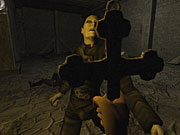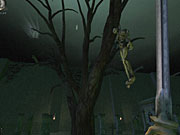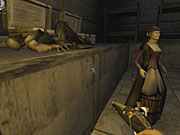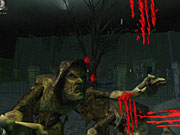In some ways, Nosferatu: The Wrath of Malachi is the most satisfying horror game to hit the PC in some time. It features an old-fashioned Universal movie sensibility, monsters that make you leap out of your chair, and a creepy chateau that puts Dracula's castle to shame. In other ways, however, Nosferatu is amateurish and annoying. Developer Idol FX makes some rookie mistakes here with random monster spawning and an abbreviated plot heavily reliant on key quests that sometimes make you more furious than frightened.

Still, it's hard not to be won over by the uncanny atmosphere, especially if you're a horror fan looking for something suitably spooky this close to Halloween. Nosferatu is essentially a first-person shooter set in a massive gothic castle. You play as James Patterson, an Englishman traveling to Romania for the wedding of your sister Rebecca to the mysterious Count Malachi. The rest should be pretty obvious. James' future brother-in-law is actually a vampire, and he's sequestered the entire Patterson family in his cobwebby digs where they await an evil fate. Your job is to rescue them and, in the process, foil whatever nefarious plan the ancient bloodsucker is concocting.
The gameplay is just as straightforward as the plot, cribbed from a thousand novels and movies. If you've ever read a vampire story and played a shooter, there aren't any surprises here (although the ending is more downbeat than you might expect). Castle Malachi features a large courtyard that serves as a hub for explorations in the east, west, and main wings of the castle. You venture into the massive pile, kill monsters, find various sorts of keys (actual keys, sacred scrolls, and the like) to unlock sealed chambers, and save your relatives by guiding them to a sanctified chamber where they reward you with goodies from their suitcases. There are no puzzles to solve, no chasms to leap, and no characters to role-play. The only variation on the usual formula is a time limit of two hours to save everyone. Aside from this interesting tweak, this is an old-school shooter in almost every way.

Yet Nosferatu doesn't feel stripped down, like so many other cheapie shooters. While nobody will mistake Nosferatu for a big-budget effort from a major studio, you don't need big bucks to scare people. Idol FX has done a lot with very little here, building a spine-tingling setting with the use of a few nifty touches. Graphics are a few years behind the times, but the developers turn this into a plus with a grainy texture that makes the game look like a classic Universal monster movie from the 1930s. Dark castle rooms emphasize this characteristic, which makes even the most innocuous corridor appear somewhat ominous. Anyone who's watched those old films will immediately flash to memories of Bela Lugosi as Dracula or Boris Karloff as Frankenstein's monster. Additionally, the dialogue is often set up in a manner that is reminiscent of storyboards from silent movies, like the game's main inspiration, the 1922 German film Nosferatu.
The audio is even better. The musical score is tremendous and is the equal of anything that's accompanied classic fright flicks. It rises and swells and comes with enough variations to never get on your nerves. Even the pounding tempo that announces the imminent arrival of something that passed its "best-before" date in the 15th century comes in so many flavors that it never fails to creep you out. The music also features those high-pitched strings composers use to keep moviegoers on the edge of their seats. Add to that disembodied voices, appropriate weapon slashes and booms, and distinctive monster shrieks, and you have to fight the desire to cover your eyes at times.
The game's atmosphere is further developed by giving the player time to appreciate the scary surroundings. Although action is fairly steady, you don't have to wade through hordes of creatures, as in Clive Barker's Undying. You spend much more time in anticipation of what's going to pop out around the next corner than you do in actual combat. Weapons reflect this measured pace. A sword, crucifix, chalice of holy water, and single-shot flintlock (which takes an eternity to reload) are among the key implements used to dispatch the undead. All but the flintlock, which needs just a single bullet to kill most corporeal foes, and machine gun require a fair bit of use before enemies fall. Many monsters attack with claws, jaws, and other melee weapons, so a lot of fighting is done up close and personal.

This doesn't mean that Nosferatu is easy. Monsters are very tough, even in groups of two or three--and especially if you let them get too close. They're also quick, so it's tough to keep them at a distance. Zombies are veritable track-and-field champions, and other villains, like dogs, shadows, ghouls, flintlock-firing corpses, scythe-wielding hunchbacks, and, of course, vampires (who slowly rise from their coffins by eerily floating to a standing position), aren't far behind.
Battles are frenetic and brutally short, albeit choppy, due either to poor animation or an attempt to give the game the quick-cut feel of modern slasher flicks. Either way, it's something to which you quickly get accustomed. It eventually seems fitting, due to the way it covers up AI quirks that cause enemies to occasionally get stuck and because of the stamina meter that goes up during every fight. When it gets high enough, you get tired, have problems fighting and running, can be heard wheezing in fear and exhaustion, and even seem to hold your weapon with a shaky hand. Based on your nervous condition, it's not a surprise that the camera is jerking around a bit.
There are some definite problems with game mechanics. Perhaps to make up for the absence of multiplayer modes, Idol FX has made Castle Malachi completely random. Although the game is centered around the courtyard hub and the wings of the castle that don't move, the rooms inside these parts of the old heap are rearranged every time that you begin a new game. Not a bad idea. Unfortunately, though, this neat building-block trick was made possible by making most of the rooms and corridors fairly generic. You see the same iron gates, shields on a wall, and shadowy, torch-lit stairwells numerous times--even in the first hours of play. By the time the game ends, you're thinking more about hiring Count Malachi an interior decorator than killing him. Thankfully, it isn't hard to find your way around as the simple plot pushes you straight ahead in almost every situation.

Much more irritating is the random spawning of monsters. The number and type of creatures changes constantly between loads, so you never really know what you're going to face. This is helpful at times. If you run into overly stiff opposition in an important room, you can hit the quick-load key and hope that easier foes are generated the next time. Doing this is actually necessary early on, as the game is sometimes tough to the point of being unbalanced. And there is something to be appreciated in never knowing when a monster is going to jump out from behind a door.
Mostly, however, the random spawning is a detriment. Quick saving is always a risk, even in an empty room, as you never know what sort of company you're going to have when you reload. Save with low health, and you chance getting killed the moment you reload, thanks to the pack of ghouls that the random monster spawner decided to dump in your lap. In this situation, you often have to reload the same save two or three times before getting a creature complement that you can handle without taking any damage. Also, there isn't any directional sound support, so you often can't tell where these spawned beasties are coming from until they attack you from out of the gloomy darkness.
So Nosferatu isn't exactly refined. Yet even with these flaws, the game is an impressive effort, especially considering its bargain sticker price. Idol FX understands what it takes to scare gamers and often lets them scare themselves by leaving pauses in the action so that they can think about what might be waiting at the top of the next staircase. The developer might not have created the most technically sound action-oriented horror game out there, but it has provided outstanding thrills and chills.